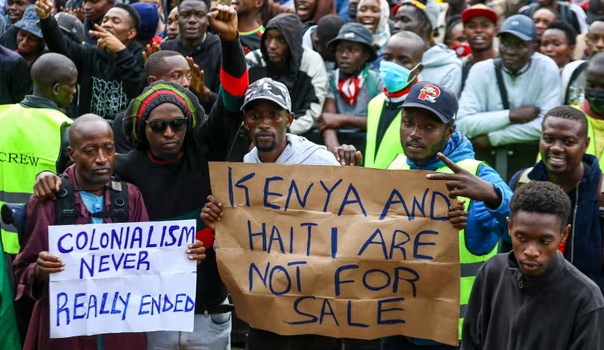The mounting debt of Kenya’s East African economic hub is expected to grow further after deadly protests forced the rejection of a finance bill that President William Ruto said was needed to raise revenue. He now warns that “it will have huge consequences,” AP News reports.
Faced with calls from the public to resign, Ruto said the government would resort to cutting the $2.7 billion budget deficit in half and borrow the remaining amount, but did not specify from where.
After anger over the bloated bureaucracy and the lavish lives of senior officials sparked protests, Ruto pledged to cut funding for his own office and said funding would stop for the offices of the first lady, the “second lady” – the vice president’s wife – and the wife of the prime minister’s cabinet secretary. Nearly four dozen state-owned enterprises with duplicative functions will be closed.
During his two years in office, President Ruto has become hugely unpopular because of his drive to impose taxes that should allow Kenya to pay off $80 billion in public debt to creditors including the World Bank, the International Monetary Fund and China.
Public debt accounts for about 70 per cent of Kenya’s gross domestic product, the highest in 20 years.
Economist Mbui Wagacha, a former adviser to previous president Uhuru Kenyatta, believes Kenya needs a professional budget and management body similar to the Office of Management and Budget in the US. Currently, Kenya’s treasury makes budget estimates and sends them to the parliamentary finance committee, which drafts financial bills. Wagacha said in an interview:
“Parliament has abdicated its mandate on the public finances in the Constitution and it’s looking after its own interests.”
He said Kenya’s further borrowing could be “disastrous” and suggested a strategy of using diplomacy to attract investment and debt restructuring in an attempt to get creditors to write off some of the debt.
Another economist, Ken Gichinga, agreed that government borrowing would slow down the Kenyan economy. He said businesses are still reeling from the effects of the COVID pandemic and the war in Ukraine. Gichinga said:
“When the government borrows more, interest rates go up. And when interest rates go up, businesses slow down, the economy slows down, due to the high cost of repayment.”
The Kenyan president favours self-reliance, saying the country should generate more revenue instead of borrowing. He said in May:
“If we are a serious state, we must be able to enhance our taxes.”
But Kenyans have rejected attempts to raise taxes as they grapple with rising prices of basic goods, and even stormed parliament during recent protests.
Last week, days after announcing he would not sign a finance bill he once championed, Ruto said he had worked hard to “pull Kenya out of the debt trap” and that there were huge consequences ahead.
The IMF, which has proposed some of the controversial tax changes, has become a target of discontent among the Kenyan public. Some protesters held placards with inscriptions such as “IMF ends colonialism.”
In a statement late last month, the IMF said it was monitoring the situation in Kenya, adding that its main goal was to help the country “overcome the difficult economic challenges it faces and improve the economic prospects and well-being of its people.”
